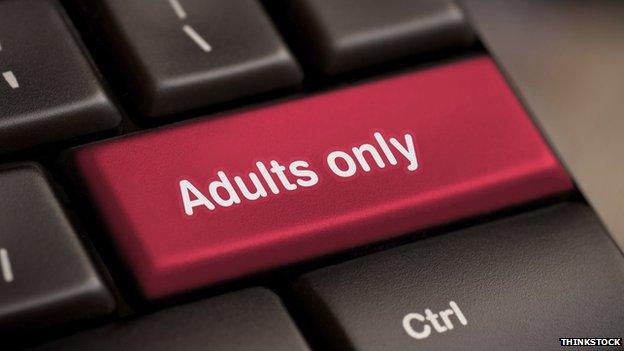How far can a government police internet porn?
- Published
- comments

The other day I asked whether technology would be an issue at the general election - and concluded that it almost certainly would not.
Well, within a couple of days I was proved wrong. The Conservatives came up with a plan which could involve major changes in the way the internet is regulated.
They say that if they are re-elected they will act to prevent children from getting access to websites offering pornography. That is a policy which other parties are very unlikely to oppose, but it could become more controversial once the practicalities of making this work become clear.
The Culture Secretary Sajid Javid explained at the weekend that the plan involved setting up a new regulator to ensure that websites verified the age of anyone who wanted to see pornographic material.
In fact, this is exactly the change in the law that was demanded last year by an existing regulator Atvod, which monitors online video sites and has been seeking to make sure companies don't allow children to see material they would not be allowed to buy in a shop.
There are, however, two problems. How do you set up an age-verification system, and how do you deal with overseas sites that refuse to comply with British regulations?
Age verification has proved tricky for sites like Facebook, but it may be about to get easier. The government's new Verify system, which uses independent identity checkers such as Experian and the Post Office, could be imposed on the pornography websites. Mind you, Verify has had some teething problems. Some civil liberties groups see it as a way of bringing in ID cards by the back door and there is also the question of whether adult pornography users should be forced, in effect, to register their activities with the government.
But the trickier issue is how to deal with the vast majority of pornography sites which are outside the UK and may be disinclined to obey the rules. Dr Gilad Rosner, an academic who has been an adviser to the Cabinet Office on privacy, says this would have to involve forcing internet service providers to blacklist offending sites. But, he points out, this approach has been tried with illegal file sharing sites and has largely failed.
"In the end," says Dr Rosner, "this is another battle between the global nature of the internet versus states attempting to enforce national laws."
Meanwhile, there is also some doubt about the scale of the problem. A couple of days before the Tories unveiled their plan, the NSPCC made headlines with a survey claiming that a tenth of 12 and 13-year-olds felt they were addicted to pornography.
But the Vice News site examined the methodology behind this research, external and found it wanting. The survey was carried out by a market research group which pays people for taking part in surveys and boasts that its polls "generate content and news angles and secure exposure for your brand".
There is no doubt that parents are worried about what their children see online, and that politicians want to be seen to be offering policies which can help. But experience shows that it is easy to talk about measures to control what happens online, much harder to put them into practice.